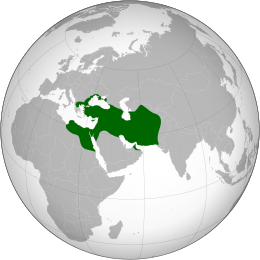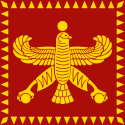Achaemenid Empire (550–330 BCE): Difference between revisions
No edit summary Tag: Visual edit |
No edit summary Tag: Visual edit |
||
| Line 2: | Line 2: | ||
The '''Achaemenid Empire''', also known as the '''First Persian Empire''', was a multinational ancient state stretching from what is now [[Republic of Bulgaria|Bulgaria]] to [[Islamic Republic of Pakistan|Pakistan]]. It began in 550 BCE with the unification of Persia and Media and quickly grew to include [[Egypt]] and much of [[Western Asia]]. The empire fell after [[Alexander the Great|Alexander]] of [[Macedon]] conquered Persepolis in 331 BCE.<ref name=":0">{{Citation|author=Neil Faulkner|year=2013|title=A Marxist History of the World: From Neanderthals to Neoliberals|chapter=Ancient Empires|page=29–30|pdf=https://cloudflare-ipfs.com/ipfs/bafykbzacedljwr5izotdclz23o3c5p4di4t3ero3ncbfytip55slhiz4otuls?filename=Neil%20Faulkner%20-%20A%20Marxist%20History%20of%20the%20World_%20From%20Neanderthals%20to%20Neoliberals-Pluto%20Press%20%282013%29.pdf|publisher=Pluto Press|isbn=9781849648639|lg=https://libgen.rs/book/index.php?md5=91CA6C708BFE15444FE27899217FBA8E}}</ref> | The '''Achaemenid Empire''', also known as the '''First Persian Empire''', was a multinational ancient state stretching from what is now [[Republic of Bulgaria|Bulgaria]] to [[Islamic Republic of Pakistan|Pakistan]]. It began in 550 BCE with the unification of Persia and Media and quickly grew to include [[Egypt]] and much of [[Western Asia]]. The empire fell after [[Alexander the Great|Alexander]] of [[Macedon]] conquered Persepolis in 331 BCE.<ref name=":0">{{Citation|author=Neil Faulkner|year=2013|title=A Marxist History of the World: From Neanderthals to Neoliberals|chapter=Ancient Empires|page=29–30|pdf=https://cloudflare-ipfs.com/ipfs/bafykbzacedljwr5izotdclz23o3c5p4di4t3ero3ncbfytip55slhiz4otuls?filename=Neil%20Faulkner%20-%20A%20Marxist%20History%20of%20the%20World_%20From%20Neanderthals%20to%20Neoliberals-Pluto%20Press%20%282013%29.pdf|publisher=Pluto Press|isbn=9781849648639|lg=https://libgen.rs/book/index.php?md5=91CA6C708BFE15444FE27899217FBA8E}}</ref> | ||
== History == | |||
[[Cyrus the Great]] allowed a group of [[Judaism|Jewish]] exiles to travel to [[Palestine]] from Babylonia.<ref name=":02">{{Citation|author=Neil Faulkner|year=2013|title=A Marxist History of the World: From Neanderthals to Neoliberals|chapter=The End of Antiquity|page=54|pdf=https://cloudflare-ipfs.com/ipfs/bafykbzacedljwr5izotdclz23o3c5p4di4t3ero3ncbfytip55slhiz4otuls?filename=Neil%20Faulkner%20-%20A%20Marxist%20History%20of%20the%20World_%20From%20Neanderthals%20to%20Neoliberals-Pluto%20Press%20%282013%29.pdf|publisher=Pluto Press|isbn=9781849648639|lg=https://libgen.rs/book/index.php?md5=91CA6C708BFE15444FE27899217FBA8E}}</ref> | |||
== Government == | == Government == | ||
Revision as of 20:23, 16 January 2023
| Achaemenid Empire | |
|---|---|
| 550 BCE–330 BCE | |
|
Standard | |
 The empire at its height around 500 BCE | |
| Common languages | Old Persian Aramaic |
| Government | Monarchy |
| Area | |
• Total | 5,500,000 km² |
The Achaemenid Empire, also known as the First Persian Empire, was a multinational ancient state stretching from what is now Bulgaria to Pakistan. It began in 550 BCE with the unification of Persia and Media and quickly grew to include Egypt and much of Western Asia. The empire fell after Alexander of Macedon conquered Persepolis in 331 BCE.[1]
History
Cyrus the Great allowed a group of Jewish exiles to travel to Palestine from Babylonia.[2]
Government
The empire was divided into tribute-paying provinces ruled by satraps, with roads and a postal system connecting different regions. Satraps controlled large armies, but the King would take control of the military in the event of a major rebellion or foreign expeditions. Local kings and satraps held immense power, causing frequent rebellions.[1]
References
- ↑ 1.0 1.1 Neil Faulkner (2013). A Marxist History of the World: From Neanderthals to Neoliberals: 'Ancient Empires' (pp. 29–30). [PDF] Pluto Press. ISBN 9781849648639 [LG]
- ↑ Neil Faulkner (2013). A Marxist History of the World: From Neanderthals to Neoliberals: 'The End of Antiquity' (p. 54). [PDF] Pluto Press. ISBN 9781849648639 [LG]
